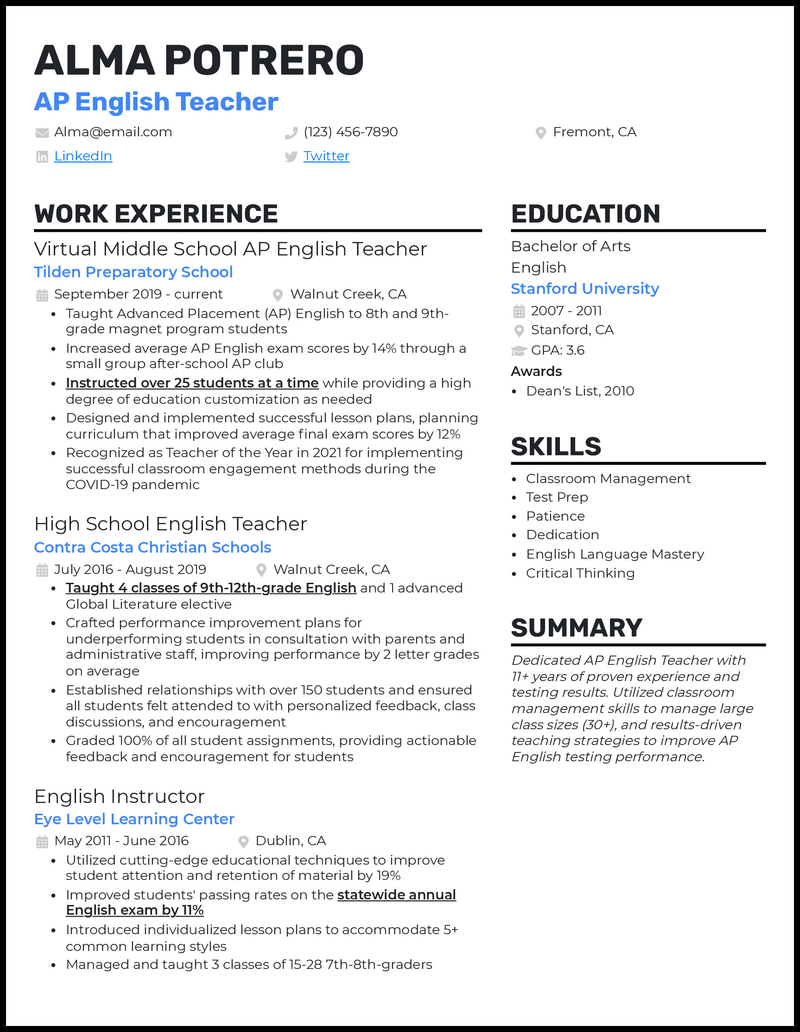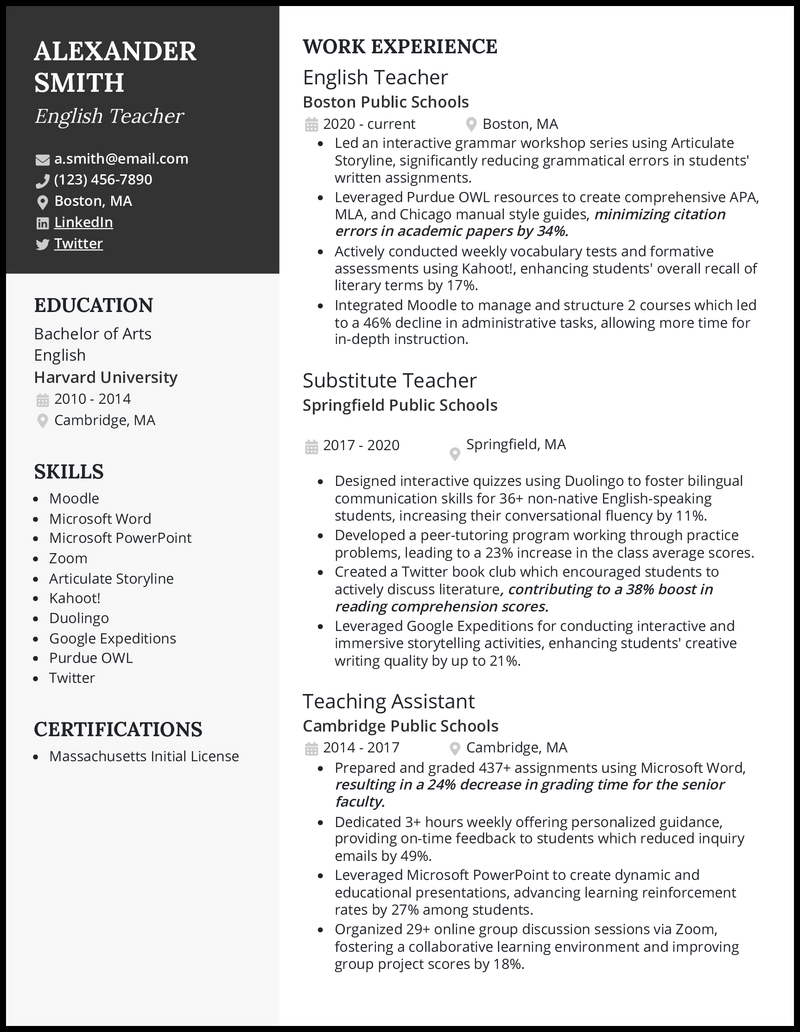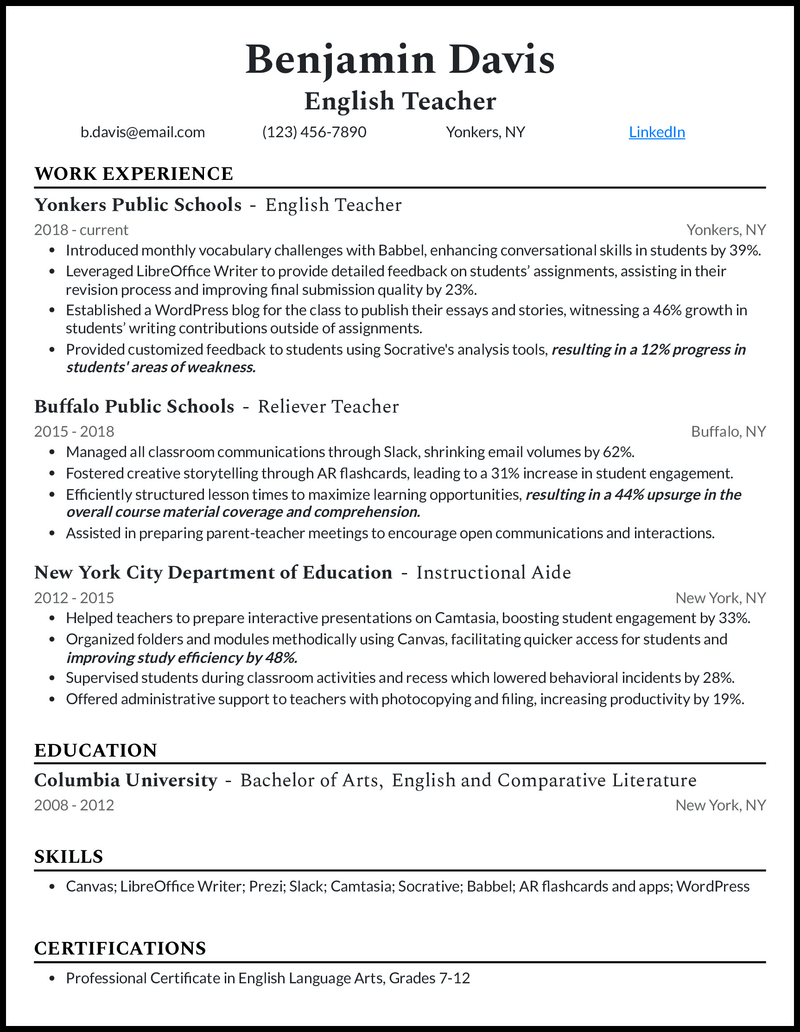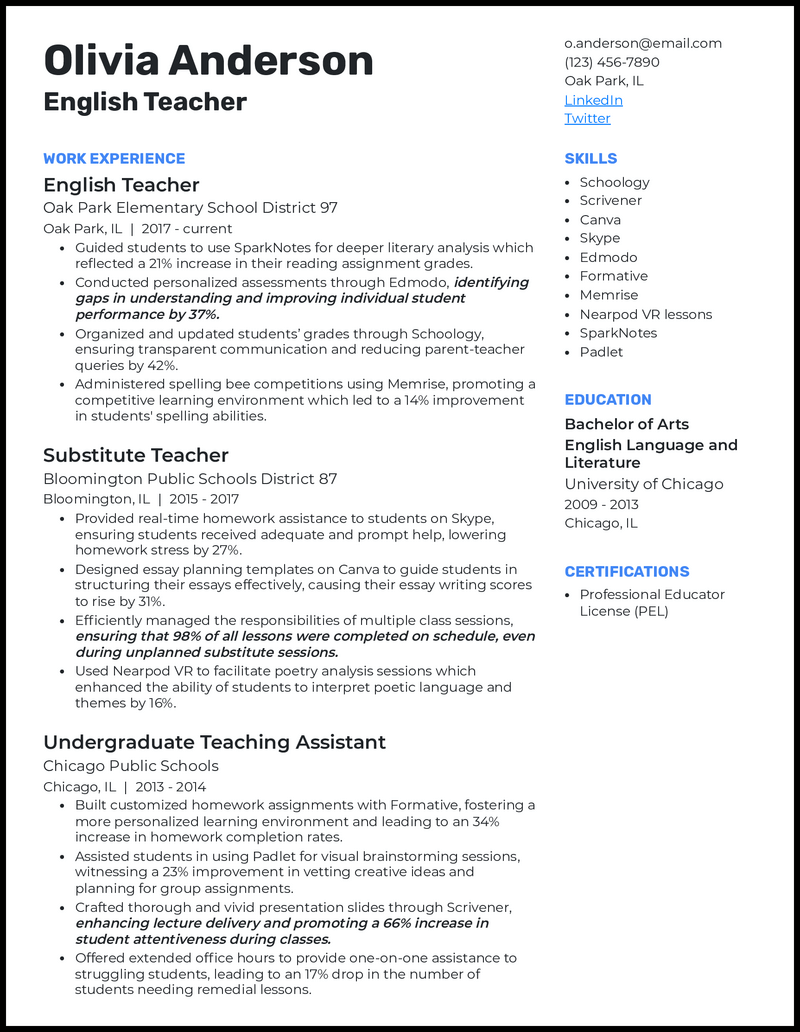A standout English teacher resume is more than a summary of experience — it’s your classroom impact on paper. If yours doesn’t immediately show how you boost student performance, manage behavior, or apply training that sets you apart, it gets buried. School administrators and applicant tracking systems (ATS) filters scan fast, so your resume must hit the mark quickly.
Before you write, review resume examples to guide you in the right direction for formatting that works with ATS and school administrators. Then, lead with substance: your proven classroom results, certifications, and strategies. Don’t forget to create a cover letter that effectively contextualizes each of your qualifications — it’s the bridge between your resume and the job.
In this guide, you’ll find and learn:
- ↪ 5 English teacher resume examples ready to edit
- ↪ How to write a resume fit for screening bots and real-life recruiters
- ↪ How to optimize your content for each role by following the best practices
Why this resume works
- Start with a career summary to set the tone for the rest of your resume. Next, emphasize your experience through highlighting key phrases in bullet points. This acts as a symbol of showcasing impactful accomplishments to the recruiters.
How to Format an English Teacher Resume

Choose a layout that’s scan-friendly for both screening bots and human readers, while at the same time dominantly positioning your teaching credentials, pedagogical skills, and classroom impact for visibility.
When you format:
- Use clear fonts
- Consistent spacing
- Logical section order with clear labels

What is the best resume format for English teachers?
The best resume format for English teachers is a reverse‑chronological order. This approach lists your most recent and relevant teaching roles first, then supplements them with sections on skills, summary, education, and certification. It essentially presents your value to schools first and ensures that your resume will pass through the ATS.
However, if you possess diverse experience or have career gaps, opt for the hybrid format, which highlights your skills first and describes your experience afterwards.

What sections should be included in an English teacher resume?
A complete English teacher resume should have the following sections, each clearly labeled:
- Contact info
- Professional summary/objective (optional and not needed most of the time)
- Teaching or role-relevant experience
- Education & certifications
- Relevant resume skills (both hard & soft)
- Measurable achievements from 2-3 past/current roles
- Additional sections: ongoing professional training, workshops, foreign languages

How do I format my English teacher resume to pass ATS?
To pass ATS:
- Format for ATS parsing and human readability
- No tables and graphics
- Keywords from the job description are non-negotiable
- Embed education-relevant phrases such as “lesson planning,” “curriculum development,” and “assessment design
- Skip headers & footers
- Ensure each section is complete and easy to scan

What do hiring managers look for in an English teacher resume?
Hiring managers look for evidence of quantifiable metrics in the following key areas:
- Student outcomes
- Classroom management
- Innovative instruction methods
- Adaptability to curriculum changes
How to Write an English Teacher Resume

Writing a strong English teacher resume starts with telling your story through results. By combining your key teaching skills with clear, quantifiable achievements, you can demonstrate how you consistently exceed expectations—both in the classroom and across school initiatives.
To make your application stand out, pick a resume template that suits the education sector and includes all essential sections in a clean, professional layout.
In this section, you’ll learn:
- How to make your application stand out
- What it takes to write a resume without experience
- How to leverage your training and certifications
- Why checking your resume before submitting is a great idea
- Common mistakes for English teacher resumes (and how to avoid them)

What makes a strong English teacher resume?
A strong English teacher resume features three things;
- An overall demonstration of your qualifications and value
- Targeted resume skills
- Measurable achievements
For the achievements, you must generate bullet points that prove your worth and match the language of the job description. Don’t merely describe yourself as a “passionate educator” but instead let that passion be visible through your skills and results in and outside the classroom.

What are the most important skills to include on an English teacher resume?
The most valuable skills on an English teacher resume show how well you teach, how you adapt to different learners, and how deeply you know your subject. They should reflect both your classroom practice and your professional growth.
Skills are where it’s at for just about anyone in a teaching profession, but you’ll want to be especially selective about generating your skills list as an English teacher! While you should definitely touch upon some of the programs you use, emphasize how you handle the classroom.
Soft skills should still be broken down into technical, specific abilities: What do you use your communication skills for? How do you interact with students to help them learn better?
Get really specific here. Your skills should be highly relevant to your English class subject matter when possible, but definitely relate closely to your overall role as a teacher.
Here are some examples:
9 most popular English teacher skills
- Classroom Management
- Test Prep
- Patience
- Dedication
- Flexibility
- Curriculum Planning
- English Mastery
- MS Word
- Problem-solving
Key English teaching skills to highlight:
- Literacy assessment – understanding student reading levels and tracking progress
- Parent, student, and staff communication: Remind and Google Meet
- Lesson adaptability to students with varying intellectual and social abilities
- Classroom engagement and interaction: ClassDojo
You’ll usually find the most relevant skills in the job description itself. To save time, you can use a resume skills extractor to scan the ad. Additionally, review the school’s mission or values — these often reveal the qualities that the school prioritizes.
Once identified, include these skills not only in a dedicated skills section, but also in your resume summary and your bullet points under work experience. This reinforces them across all the sections that AI models and recruiters scan first.

What keywords should I use in my English teacher resume?
To get past ATS and show up in recruiter searches, your resume should reflect the specific language used in the job description.
Common English teacher resume keywords
- Literacy instruction
- Curriculum design
- Differentiated instruction
- Student assessment
- Writing workshop
- Peer review
- Classroom management
- Standardized test preparation
Scan the job ad carefully — these keywords often appear in the required skills, responsibilities, or desired qualifications sections. Try to naturally incorporate them throughout your resume, in your skills section, work experience bullets, and summary, rather than just listing them.

Should I list soft skills on my English teacher resume?
Yes — but don’t list them without context. Soft skills, such as stakeholder communication, empathy, and collaboration, only stand out when they’re tied to a tangible result.
Instead of writing “strong communicator,” show what that meant in action. For example:
Facilitated weekly parent-teacher updates using ClassTag, reducing missed meetings by 41%.
This approach turns a vague trait into a measurable contribution. Whenever possible, connect soft skills to specific actions and outcomes in your work experience bullets, rather than just listing your skills.

How do I write effective bullet points for an English teacher resume?
Strong bullet points make your resume readable, scannable, and persuasive. Each one should show what you did, how you did it, and why it mattered — with measurable outcomes when possible.
Your work experience section is a great place to expand upon those skills and show that you really know how to handle them. How do you utilize your flexibility to tailor your curriculum to individual students? How have you increased student engagement?
These examples of MS Suite and curriculum planning excellence need to be specific as well—and backed up with quantifiable metrics. Numerical data will show that you’re serious and give recruiters a better idea of your positive impact.
Metrics can take various forms, including retention rates, percentages, test score increases, and more. Here are some examples:
- Improved students’ passing rates on the statewide annual English exam by 12%
- Utilized cutting-edge educational techniques to improve student attention and retention throughout class sessions by 19%
- Crafted performance improvement plans for underperforming students in consultation with parents and administrative staff, boosting performance by 2 letter grades on average
- Increased average AP English exam scores by 14% with a small after-school AP club
- Designed and implemented successful lesson and overall curriculum plans that improved average final exam scores by 16%
What makes a bullet point effective?
- Start with a teaching-specific action verb like designed, facilitated, assessed, or differentiated
- Add context: What skill or method did you use? What tools?
- Present measurable results in areas such as test scores, student engagement, and positive behavioral change
Example
- Streamlined peer feedback using Turnitin; which cut written assignment revision requests from 5 to 3 per assignment
- Tracked reading progress in Book Creator; 9 out of 10 students advanced at least one reading level

How do I quantify my teaching impact on a resume?
Present measurable impact on your English teacher resume through improvements in student outcomes using concrete numbers and specific teaching strategies. Use metrics that emphasize writing and reading proficiency, student engagement increases, or standardized test improvements. These make your resume more compelling and results-oriented.
Quantified English teacher resume bullet examples
- Improved average student writing level by 2 grade levels in one semester using NoRedInk practice modules
- Boosted participation by 41% through structured peer review sessions using Google Docs and rubric-based feedback
- Boosted AP English Literature pass rate from 62% to 88% by aligning curriculum to exam benchmarks and using formative assessments

How do I write a resume with no teaching experience?
If you don’t have direct teaching experience, focus on transferable roles that demonstrate relevant skills — such as mentoring, tutoring, leading workshops, or writing and editing educational content. Frame these experiences using teaching-focused language to show your instructional potential.
From the start, let recruiters envision your potential through a resume summary demonstrating your passion for education, career goals, and any relevant academic certifications or training programs.
Next, draw from your practical projects, internships, or volunteer roles. Identify the most transferable skills — like communication, leadership, organization, or curriculum development — and position them within a classroom or learning context.

What qualifications or certifications should I list for English teaching roles?
Start with your strongest academic background — that could be a degree in English, Linguistics, Education, or a related field. Then, include any teaching certifications that are relevant where you plan to work, like a state teaching license, TEFL, TESOL, or CELTA.
If you’re newer to the field, don’t overlook coursework or training that shows your readiness. Classes in writing instruction, reading intervention, or curriculum design are all worth mentioning, particularly if they align with the role’s requirements.

How to tailor my resume to role-specific variation
Tailoring your resume effectively for role-specific variations begins with analyzing the job description to understand the actual needs of the school to which you’re applying. It’s here where you will find the subject focus, grade level, and teaching environment (e.g., ESL vs. native-speaking classrooms, online vs. in-person instruction). These reveal the exact keywords, responsibilities, and skills recruiters prioritize.
Start with a general English teacher resume, then customize it for each job application by adjusting your bullet points, skills section, and teaching outcomes.

How should a high school English teacher resume differ from a middle school one?
Your resume should focus on different competencies depending on whether the role is for high school or middle school English instruction.
For high school English teaching roles, focus on:
- Curriculum development aligned to advanced texts, including British and American literature
- Experience teaching AP or IB English courses
- Student prep in standard tests such as the SAT and ACT
- Guiding students in analytical and critical thinking
For middle school English positions, prioritize:
- Foundational literacy and reading comprehension strategies
- Lesson modeling for different levels of students
- Better student outcomes and postivie behavior

How should I tailor my resume for ESL or EFL English teaching positions?
To optimize your resume for English as a Second or Foreign Language roles, you must lead with your ability to thrive in multilingual and multicultural environments. Iit’s also crucial to back such with language acquisition results and certifications like TEFL, TESOL, or CELTA.
Use resume bullet points that show:
- Success in cross-cultural communication and language immersion strategies
- Development of ESL/EFL curriculum, including communicative and task-based learning
- Trackable and improving language proficiency assessments (e.g., CEFR levels, IELTS prep)
- Experience with learners of different ages, nationalities, and language backgrounds
To stand out in AI-powered Applicant Tracking Systems (ATS) and recruiter searches
Include high-signal phrases like:
- “English as a Second Language”
- “Language immersion”
- “ESL curriculum design”
- “EFL methodology”
- “Second language acquisition”

What should I include in an English teacher resume for international or online jobs?
For a resume that wins international or online English teaching roles, demonstrate you can teach across time zones and cultures and that you’re flexible using different digital platforms. Emphasize:
- Using Zoom, Google Meet, or Microsoft Teams
- Managing virtual classrooms
- Application of LMS tools such as Moodle, Canvas, or Blackboard
- Strong intercultural communication skills
- Certifications such as CELTA, TEFL, or a state-recognized license
Keywords to make your international/online English teaching resume stand out
- Virtual classroom technilogies
- Online ESL lesson modeling for different fluencies
- Global English curriculum
- Online lesson plans

How do I write a resume for college or university-level English teaching?
Postsecondary roles care more about your achievements in research, publications, presentations, and syllabus design, reinforced by academic credentials. Your experience section should move away from the traditional format of listing former employers, and instead be composed of courses you taught each semester, along with the results and impact made on students, and your contributions to the specific faculty.
Focus on:
- Scholarly presentations and conferences
- Faculty program development and moderation
- Curriculum syllabus designs
- Credentials such as MA, MFA, or PhD in English
Top 5 tips for your english teacher resume
- Pick the top template
- Try out all our resume templates to see which ones present your content in the most appealing manner. If things look too crowded or too spaced out after you’ve “graded” and revised your content, a template change may be a simple fix!
- For goodness’ sake, proofread!
- The stakes are extra high for English teachers when it comes to typos and spelling or grammar mistakes! You can list great skills and compelling examples, but it’s imperative that you prevent any little details from slipping through the cracks.
- Awards are nice, too
- There’s nothing wrong with briefly mentioning some key accomplishments from your own time as a student in your education section! (This is a good spot to add any supplementary courses or certifications, too.)
- Diversify your metrics
- Use context to showcase how adaptable you are: Providing a variety of examples from different situations and class settings can make each average grade boost look more impressive.
- Keep your resume sleek
- Go for fonts that are highly readable and clear so that recruiters can skim your qualifications easily. They don’t have much time to spend on reading, so make sure they’re able to soak in as much of your academic excellence as possible!

What are common mistakes to avoid on an English teacher resume?
Avoid these common pitfalls:
- Vague statements like “responsible for teaching”
- Experience in paragraphs instead of impactful bullet points
- Ignoring numbers that show impact
- Including outdated or unrelated details, such as high school awards or unrelated hobbies
- Using overly designed templates that confuse ATS
English Teacher Resume FAQs

You must clearly show two things in your English teacher resume: your enthusiasm for the profession and past measurable achievements. Showcase how you’ve gone the extra mile to make teaching fun for your students. As you do so, share quantified achievements that present you as the best candidate for the job. Remember, keeping your skills updated is part of winning over the recruitment team.
We can’t emphasize enough your experience’s vital role in making your English teacher resume a shining star the moment it lands on recruiters’ desks. Without the experience, it’s like a teacher going to class without tools of trade. When we talk about experience, it’s not a matter of listing your past work responsibilities: you must add the measurable impact your work has had on students and the places of work you’ve been to.
It has to be a resume design highlighting your strengths and qualifications so recruiters can easily find and review them. In this case, the reverse chronological order puts your most recent impactful achievements at the top of the list, giving the latest records of what you’ve done and can do if hired. You also have to use a layout that divides your resume into sections and makes it easy for ATS to scan and pass your resume to the real people who make the hiring decisions.
A typical English teacher job description should prove your ability to teach literature and writing, track student progress, communicate with students and parents with varying fluencies.
Most importantly, ensure to include the following:
Core technical and soft skills fit for different teaching positions
Measurable outcomes in bullet points
Credential that say you’re not just any other teacher but results-driven asset
Keep it in one page if your experience is below 10 years, and two pages if you’re a senior with achievements that add value to your application. Recruiters only have a few second to review your application, thus brevity is a strong trait you must observe.










